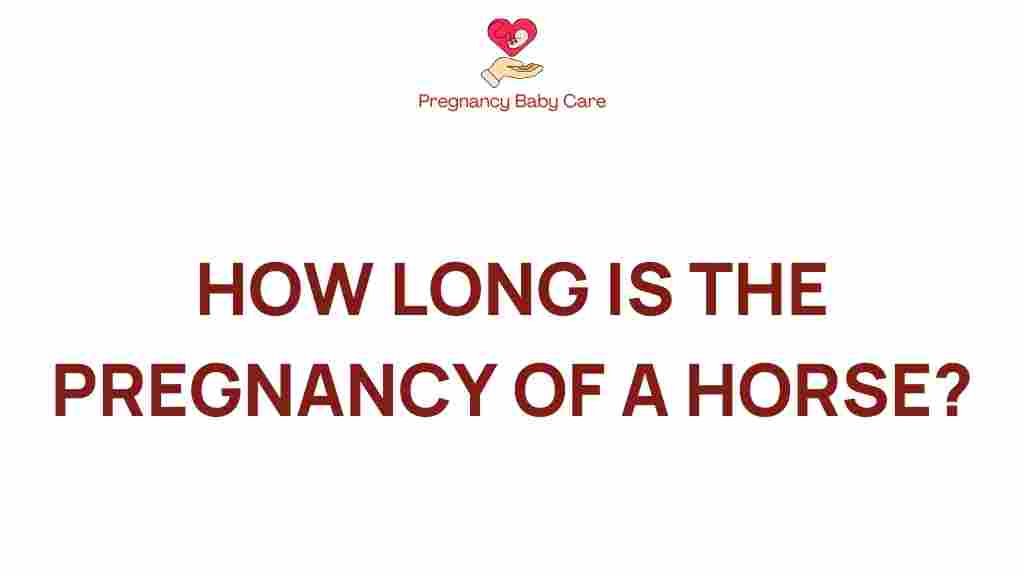Unveiling the Secrets: How Long Is the Pregnancy of a Horse?
Understanding horse pregnancy is crucial for anyone involved in equine reproduction, whether you are a seasoned breeder or a new horse owner. The gestation period of a mare is a significant aspect of horse care and can greatly influence the health and well-being of both the mare and her foal. In this article, we will delve into the details of horse pregnancy, exploring the gestation period, the stages of pregnancy, and important veterinary insights to ensure optimal care for your equine companions.
The Gestation Period of a Mare
The average gestation period for a horse, or mare, typically ranges from **11 to 12 months**, with most mares giving birth after approximately 11 months and 10 days. However, it is important to note that the gestation period can vary depending on several factors, including:
- Breed of the horse
- Age and health of the mare
- Environmental conditions
- Nutrition and overall care
Factors Influencing Gestation
Several factors can affect the length of horse pregnancy:
- Breed: Some breeds may have slightly longer or shorter gestation periods.
- Health: A healthy mare is more likely to have a normal gestation period.
- Nutrition: Proper nutrition during pregnancy is crucial for the mare’s health and the development of the foal.
- Stress: High levels of stress can impact gestation and may lead to complications.
Stages of Horse Pregnancy
Horse pregnancy can be divided into three distinct trimesters, each with its unique developments and needs.
First Trimester (0-4 Months)
During the first trimester, the fertilized egg implants in the uterus, and the embryo begins to develop. Key aspects of this stage include:
- Initial development of the fetus
- Formation of vital organs
- Monitoring the mare’s health and nutritional requirements
It is essential to provide the mare with a balanced diet rich in vitamins and minerals to support this early stage of fetal development.
Second Trimester (4-8 Months)
The second trimester is marked by rapid growth of the fetus. By the end of this stage, the foal starts to gain significant weight and its organs continue to mature. Important considerations during this time include:
- Regular veterinary check-ups to monitor the health of both mare and foal
- Adjusting the mare’s diet to meet increased nutritional needs
- Providing a comfortable environment to minimize stress
Third Trimester (8-11 Months)
In the final trimester, the foal undergoes its final growth spurts and prepares for birth. Key points to focus on during this period are:
- Preparing a safe and clean area for foaling
- Monitoring for signs of impending labor
- Ensuring the mare has access to fresh water and high-quality hay
Veterinary Insights on Horse Pregnancy
Veterinary care plays a crucial role in ensuring a healthy pregnancy. Regular check-ups with a qualified veterinarian can help identify potential issues early on. Here are some insights to consider:
- Ultrasound Exams: These are commonly used to monitor fetal development and check for any abnormalities.
- Vaccinations: Ensure the mare is up-to-date on vaccinations to protect her and her foal.
- Parasite Control: Regular deworming is essential to maintain the health of the mare and the developing foal.
For more comprehensive equestrian knowledge, consider consulting resources like the American Association of Equine Practitioners.
Horse Care During Pregnancy
Proper horse care during pregnancy is crucial for the health of both the mare and the foal. Here are some essential tips:
- Nutrition: Provide a balanced diet that includes hay, grains, and supplements as recommended by your veterinarian.
- Exercise: Maintain a regular but gentle exercise routine to keep the mare healthy, unless advised otherwise by a vet.
- Comfortable Environment: Ensure the mare has a clean, dry, and safe place to rest.
- Monitoring: Keep a close watch on the mare’s behavior and physical condition for any signs of complications.
Common Complications During Horse Pregnancy
Despite best efforts, complications can arise during horse pregnancy. Knowing what to look for can help in early detection and treatment:
- Twins: While rare, twin pregnancies can pose serious risks to both the mare and the foals.
- Placental Issues: Abnormalities in the placenta can affect the foal’s development.
- Infections: Mare’s can suffer from infections that can impact the pregnancy.
Signs of Complications
Be vigilant for signs of complications, such as:
- Abnormal discharge from the vulva
- Severe colic or abdominal pain
- Changes in appetite or behavior
If you notice any of these signs, consult your veterinarian immediately for a thorough evaluation.
Preparing for Foaling
As the mare approaches the end of her gestation period, preparation for foaling becomes critical. Here are steps to ensure a smooth process:
- Foaling Area: Create a clean, quiet, and safe space for the mare to give birth.
- Foaling Kit: Prepare a foaling kit with essential supplies such as:
- Clean towels
- Scissors for the umbilical cord
- Antiseptic for cord care
- Colostrum replacer
- Monitor the Mare: Be prepared to monitor her closely as she approaches her due date.
Conclusion
In conclusion, understanding horse pregnancy and the associated gestation period is vital for anyone involved in equine reproduction. With an average gestation period of 11 to 12 months, careful attention to the mare’s health, nutrition, and overall care will ensure the best outcomes for both mare and foal. Regular veterinary insights play an essential role in managing the complexities of horse pregnancy.
By following best practices in horse care and being aware of potential complications, you can contribute significantly to the successful outcome of equine reproduction. For more in-depth information on horse care and management, refer to resources like The Horse.
Embrace the journey of horse pregnancy with knowledge and preparation, and you will set the stage for a healthy and successful foaling experience.
This article is in the category Health and created by PregnancyBabyCare Team
